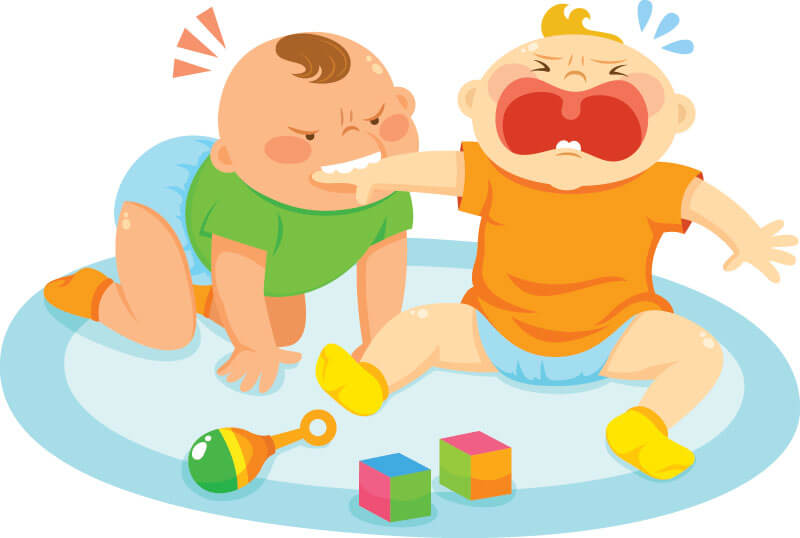
While most children younger than 3 years of age have had one or more instances where they have bitten other children, the fact is as a parent it can be an embarrassing habit to deal with. The good news is that most children give up this habit on their own past the age of 3. However, until then you need to know how to deal with such behavior. Here is help:

Why do toddlers bite?
In order to have a proper response to the child’s biting bouts it will help to know why toddlers bite, in the first place. For young children from 5-7 months of age of course, biting may be a way to release their discomfort on account of teething. For toddlers, however biting may result on account of some of these factors:
- Not so developed language skills– Often a major reason behind that bite, believe it or not, is the lack of language skills. The toddler may be too excited or angry or simply unable to convey his thoughts. Something seemingly simple as “ I want to pay” may find an expression through a bite.
- Feeling overwhelmed– A stressful situation or even a physical setting such as too much light or noise may lead to biting. Being too tired, or hungry or sleepy also may be expressed through a bite. Often children also feel frustrated and overwhelmed when they feel they are not in control. Offering age appropriate choices to kids can also significantly reduce their frustration levels and can result in fewer instances of biting.
- Need for activity– With oodles of energy, active playtime is a must have for toddlers. If they do not get active play, again it may find expression through a bite.
Knowing these reasons will come in handy for you to anticipate situations where your toddler may bite a friend or a caregiver. Looking at your toddler closely and analyzing the last few times he has bitten a friend, you can often foretell when the child is likely to bite. In such situations, you could try and distract the child to shift his or her attention to other things. However, not all situations can be anticipated and here are some continuous measures to take so that the child gives up this habit sooner than later.
Things to do if your child has a biting habit
- Arm him or her with language skills– A very important aspect is to help your child develop language skills for him or her to be able to put their feelings in words. Other than teaching him the right words it is also important to encourage your child to voice his feelings. For example if the child does not like another child standing too close to her and that has led to a biting incident in the past, you could teach the child to say it to the other child in so many words – “ I don’t like it when you stand so close.” It will work well if you help the child put into words what he or she might be thinking. In the park, if the child wants to go up on a swing, which already has another child on it, encourage him to ask the other child “ Can I have a turn on the swing?”
- Teach the child the important lesson of sharing– Ever so often, in a group set up, biting happens on account of children not wanting to share toys and other such stuff. It is important therefore to inculcate the habit of sharing in the child. There are enough and more ways to do it- you could take the child to a park and show him how they need to wait their turn for the swing. At home, with siblings you could even have a visual timer to suggest how long each of them can play with a particular toy.
- Help the child deal with anger as an emotion– There will be enough and more occasions when the child will be angry with his playmates. It is therefore important for the child to identify his emotion as “ anger” and deal with it in a constructive manner. When you see the child being angry, do remember to spell out to the child that “ you seem to be angry about…. and that it is ok to be angry. You could then help him deal with the anger. Jumping up and down, doodling, running- you could suggest appropriate ways to the child to release his anger. Consider creating a soothing corner at home that the child can retreat to, to be able to cool down. The message the child subliminally gets for his later life, is also that there is nothing wrong in being angry as long as it is channelized the right way.
- Control your own feelings– When biting happens despite your best efforts, it is normal to feel frustrated. The most important thing to do, however, is to keep your own feelings in check. Take a deep breath, count to 10, use whatever mechanism works for you to calm yourself down. It is never a good idea to respond in your own heated up state. It is also never a good idea to physically punish the child for biting another.
- Be calm yet firm– When your child bites another, ensure the message that you pass on is firm. You need to tell the child in so many words that the other child is hurting because of the bite. “No biting, biting hurts “ said in a firm tone will help pass a clear message to the child and will be far more effective than having long conversations about the effects of biting, with the child.
- Focus the attention on the person who is bitten- Ever so often in an incident involving biting, we tend to focus attention (negative, but attention, nonetheless!) on the child who has bitten. Instead it is a good idea to focus attention on the person who was bitten. That way biting does not equal attention for the child and results in fewer instances.
Much as the incident continues to hound you, after you have passed the appropriate message to the child, you need to learn to let go. Not just that, the child needs to be moved on to other activities. It will be a good idea to ask the child whether he wants to play or draw, thus helping him make a choice and be in control.
- Read- Reading books such as Teeth are not for biting by Elizabeth Verdick can be a great resource for passing the message. As you read the book, you could ask the child how the characters might be feeling, to re–inforce the message. You could also ask the toddler to tell you the story after you have read it a couple of times to allow the message to be internalized.
- Reinforce positive change- Teaching new behavior is as much about condemning wrong behavior as it is about reinforcing the right one. Each time, therefore, when your child shares his feelings do remember to encourage him or her for a job well done. Above everything, difficult as it may sound, be patient as your child takes time to learn new behavior.
Besides the above measures, it is always a good idea to build activity into a child’s routine on the one hand as also to ensure that the child isn’t over tired or sleep deprived, on the other. Seemingly small measures such as these can also go a long way in impacting the child’s behavior on a particular day.
Rest assured that biting in young children isn’t symptomatic of behavioural problems in later life. It is only if the child is particularly aggressive past the age of 3 years that you need to seek professional help.

Amita is an experienced educator with over 30 years of experience. She has an outstanding understanding of child development, having worked with various age groups for prestigious businesses. She has been dedicated to handling Footprints’s Curriculum and Delivery department for the past decade. Amita’s credentials include being one of India’s few HighScope Curriculum certified trainers and volunteering as a course leader for Landmark Education, the world’s largest training firm.

